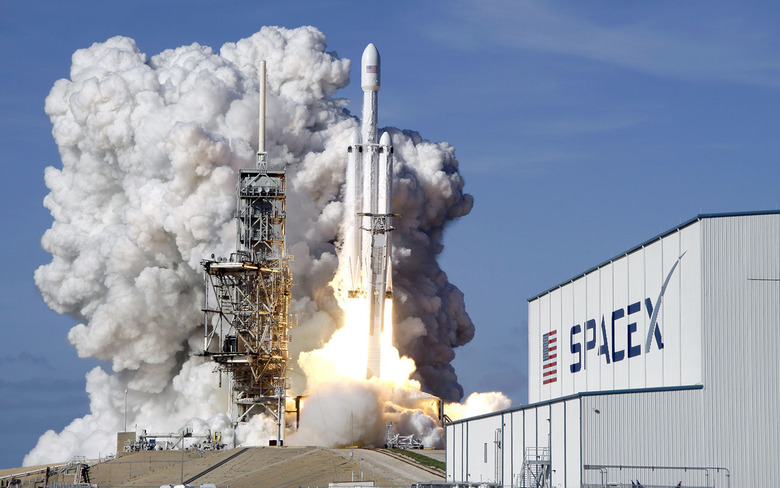Boeing Makes A Fool Of Itself By Calling Out SpaceX, Saying The Falcon Heavy Just Isn't Big Enough
When SpaceX launched its Falcon Heavy rocket earlier this year, it earned the title of "most powerful operational rocket." That little "operational" modifier is pretty important, since nothing has yet to surpass NASA's own Saturn V rocket which ferried astronauts during the Apollo missions in the 1960s and 70s. Still, it seems SpaceX's significant accomplishments have caught the eye of competitor Boeing, who is now going on the offensive and calling out the Falcon Heavy as being too small.
Boeing, which is currently under contract with the US government to develop the SLS (space launch system) rocket platform for NASA, is still years away from the first iteration of its hardware, but the company is bullish on the idea of it being the answer to the world's deep-space exploration quandary. The company is touting the yet-to-be-built rocket as the "most powerful rocket ever built," but as Ars Technica points out, that claim is tenuous at best.
Not long ago, Boeing launched a website called Watch Us Fly which highlights the goings-on at the company. It's equal parts "behind the scenes" and navel gazing, but the company's writings about SpaceX, NASA, and its own SLS rocket platform are particularly interesting. The company cites NASA commentary regarding the Falcon Heavy's ability (or inability) to deliver deep-space capabilities.
"The Falcon Heavy launch turned heads in February, but SpaceX's rocket is a smaller type of rocket that can't meet NASA's deep space needs," Boeing writes. "Once the Boeing-built SLS is operational, it will be the most powerful rocket ever built."
That sounds like an innocent bit of horn-tooting, but it's not entirely true. Like SpaceX's own rocket hardware, Boeing's SLS is being built in different configurations, with the earliest rockets being the most modest in terms of power. The first version of the SLS is expected to be capable of hauling 70 metric tons into low-Earth orbit (LEO), compared to the Falcon Heavy's current 64 ton mark, but well shy of the 118 ton capabilities of the Saturn V.
Eventually a 105 ton variant is expected to be built, which will indeed be the most powerful operational rocket, if nothing has surpassed it by that point, but still shy of the "most powerful rocket ever built" title by a decent margin. At a much later, yet-to-be-forecasted date, an SLS rocket capable of taking 130 tons into LEO is planned, but that's so far away that it's hardly even worth considering at this point.
On top of all of this, NASA's current budget woes mean that exploring beyond Earth's moon is still little more than a dream. The agency is currently shooting down all talk of a manned Mars mission, and deep space exploration is essentially out of the question for the foreseeable future. Whether Boeing is willing to acknowledge any of this is anyone's guess, but it's worth considering the facts when making such bold claims.
